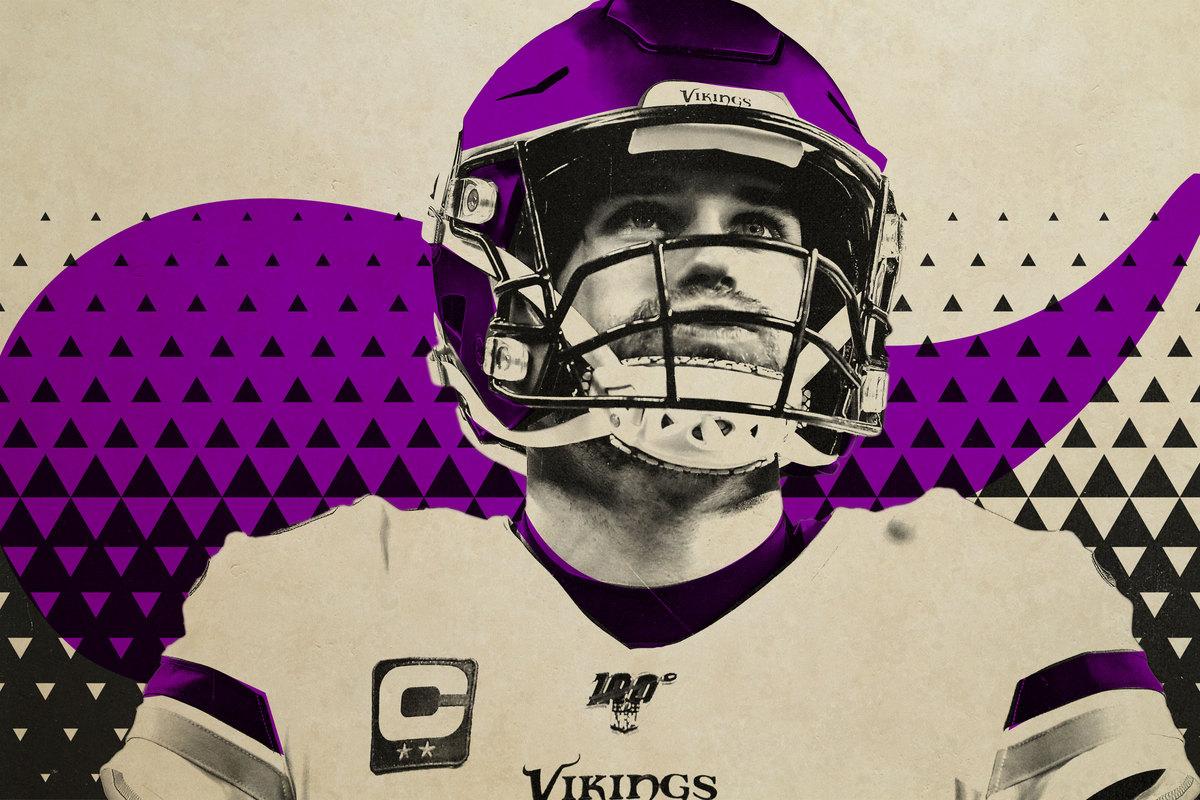As each club is eliminated from the postseason, The Ringer will examine what went right, what went wrong, and where the franchise could go from here. Today it’s the Minnesota Vikings, who were stomped by the San Francisco 49ers by a score of 27-10 in the divisional round on Saturday.
What Went Right
Call the Vikings Green Day, because they woke up after September ended. The team adjusted slowly to their new play-action-heavy offense with a 2-2 start, which threatened to unravel the team, but they quickly gathered themselves and went on an 8-2 run. Kirk Cousins was one of the league’s most efficient quarterbacks in that stretch. From the beginning of October through the end of November, he led the league in passing touchdowns, passer rating, and adjusted yards per pass attempt. Across the entire season, Stefon Diggs set a career high in receiving yards for the second straight year and finished second in Pro Football Focus’s yards per route run. Running back Dalvin Cook finally put together three healthy months, playing 14 games and accumulating 1,654 yards from scrimmage, the latter of which ranked seventh among all players. Cook’s 118 yards from scrimmage per game ranked second only to Carolina’s Christian McCaffrey.
Minnesota’s defense is still one of the league’s most talented. Vikings defensive end Danielle Hunter became the youngest player in NFL history to reach 50 career sacks. Hunter also had the second-most quarterback pressures (88) this year, with defensive tackle Everson Griffen tying for no. 15 (66). Inside linebacker Eric Kendricks was PFF’s highest-graded inside linebacker this year, and Vikings safeties Anthony Harris and Harrison Smith were the second- and third-highest graded safeties among players with at least 300 snaps. Drop that threshold to 200 snaps and Vikings safety Jayron Kearse takes the no. 4 spot behind them. Minnesota’s defense under head coach Mike Zimmer is still excellent, and the offense is finally built to play complementary football.
The Vikings’ upset over the Saints in the Superdome in the wild-card round was the sweetest moment of their season and likely ensured that Cousins, Zimmer, and general manager Rick Spielman will all be safe in their jobs. Cousins and Zimmer are both entering the final year of their contracts in 2020, but both could get extensions.
What Went Wrong
The season ended so poorly that Cousins and Zimmer may no longer get those extensions after Minnesota’s offense was exposed twice in the team’s final three games. In Week 16, the Vikings played the Packers on Monday Night Football with a chance to win the NFC North, but the Vikings mustered just 10 points. Considering the Vikings gained just 31 yards on two scoring drives, both of which came after their defense forced turnovers and gave them great field position, the game was essentially a shutout. The Vikings offense was even more ineffective in their loss to the 49ers on Saturday. With 11 minutes remaining in the fourth quarter and Minnesota down 27-10, the team had gained 41 yards on one pass to Stefon Diggs and 44 yards on their other 30 plays combined (1.5 yards per play). Minnesota improved on those numbers in garbage time, but the team still picked up just seven first downs, the third fewest in a playoff game in NFL history.
For all the blame placed on Cousins, Spielman did not build a team that can play catch-up. Receiver Adam Thielen suffered a hamstring injury in Week 7, which kept him out of six games. When Thielen returned, he didn’t make an impact until the wild-card round. Thielen’s injury exposed one of Minnesota’s bizarre problems: The team has not been able to find a no. 3 wide receiver for five years and counting. Minnesota tried throwing everyone at the position and hoping someone would stick this season, but Chad Beebe got hurt and 2016 first-rounder Laquon Treadwell remains a bust. The Vikings eventually turned to Olabisi Johnson, a Colorado State rookie they drafted in the seventh round. When Thielen got hurt, nobody other than Diggs could step up.
It’s not just the receivers that are subpar.
Minnesota’s offensive line has not played well despite their success in the running game with Dalvin Cook. Minnesota’s pass blocking was graded as the seventh-worst by PFF. Relatedly, the Vikings were no. 27 in cap space spent on their offensive line in 2019. While offensive adviser Gary Kubiak’s zone-running scheme and play-action passing hid many of Minnesota’s problems, the Vikings could not mask their blocking when they fell into third-and-long passing situations. That weakness was ruthlessly exploited in their loss to the 49ers on Saturday. In the first half, the 49ers defense rushed four or fewer pass rushers 10 times, and the Vikings gained 4 yards on those plays.
On defense, Minnesota’s cornerbacks group folded. Xavier Rhodes, an excellent corner just two years ago, had the worst season of his career. Of 120 cornerbacks who played 300 snaps, Rhodes ranked no. 115 in grading by PFF. Injuries and ineffectiveness plagued the rest of the group, and the position brought down Minnesota’s perennially elite defense to merely good. The defense gave up more points than in years past, and that made the offense’s job harder. Without Thielen or consistent blocking for Cousins, it was too much to overcome.
The Vikings failed to reach the NFC championship game for the same reason they were crushed in the NFC championship game two seasons ago. Their offensive line was completely outclassed by the NFC’s top seed. Zimmer wants the Vikings to be a physical team, but they have been manhandled for the past three years.
Free Agency
The Vikings have kept their defensive core together for an uncommonly long stretch. Eight of their 11 defensive starters this year—defensive linemen Everson Griffen, Linval Joseph, Danielle Hunter, and Shamar Stephen; linebackers Anthony Barr and Eric Kendricks; cornerback Xavier Rhodes; and safety Harrison Smith—have all been starting or playing more than half of Minnesota’s snaps since 2016. That kind of continuity is rare and has let the Vikings defense run one of the most complex schemes in the league. This offseason, the band is going to break up.
The Vikings are the only team with negative cap space entering the offseason. Just to get below the cap, the Vikings will likely have to release Rhodes, which would save the team $8 million of cap space and burn $5 million. That gets them just above zero, but then they have to figure out what to do with their other defenders. Griffen; defensive end Stephen Weatherly; linebacker Eric Wilson; cornerbacks Trae Waynes, Mackensie Alexander, and Marcus Sherels; and safeties Anthony Harris, Andrew Sendejo, and Jayron Kearse are all free agents. The Vikings have to retain or replace all of those players with almost no cap space. That is before Minnesota tries to figure out how to improve its offensive line or find a no. 3 receiver behind Diggs and Thielen. It’s also before getting into Cousins, who is entering the final year of his three-year contract for $84 million and may get an extension. The Vikings may not be able to do better than Cousins, but the price of keeping him could also ensure they aren’t able to put a better cast around him.
The Draft
Drafting for need is not always wise, but the Vikings will be tempted to take a cornerback in the first round. Minnesota has been weak at the position all season and might get weaker in the offseason, and there is plenty of talent in the draft this year. One name rises above the rest. Alabama cornerback Trevon Diggs, the younger brother of Vikings receiver Stefon Diggs, will likely go in the first round. He will inevitably be linked to Minnesota for the entire pre-draft process.
The Vikings have all of their picks in the first four rounds, and they could go defensive back twice in those picks. Clemson’s A.J. Terrell, Utah’s Jaylon Johnson, and Virginia’s Bryce Hall could all be players Minnesota will look at in the second round. The Vikings could also look to pair Danielle Hunter with another young pass rusher, like Boise State’s Curtis Weaver or Syracuse’s Alton Robinson.


